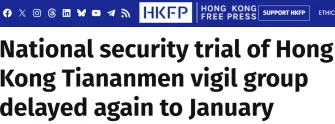The trial of Albert Ho, Lee Cheuk-yan and Chow Hang-tung was due to begin on May 6 this year, was then postponed to November 11, and is now delayed again until January 22 next year. They are accused of ‘inciting subversion of state power’ as leaders of the HK Alliance in Support of Patriotic Democratic Movements of China, which organized Tiananmen vigils for years. If you are charged under the NatSec Law, you cannot get bail. Thus Chow and Lee have already spent over 1,500 days in pre-trial detention.
HKFP story.
Amnesty International issues a statement in which an Executive Director says…
…the National Security Law uses the vaguely defined ‘endangering national security’ as a pretext to systematically deny defendants the right to bail, seriously undermining their right to a fair trial.
More importantly, freedom of expression is a human right. Chow Hang-tung and Lee Cheuk-yan should never have been arrested and prosecuted for commemorating 4 June and seeking historical truth. The Hong Kong government must immediately drop the charges and release both of them.
For anyone who doubts that the authorities ordered all Hong Kong’s older all-patriots lawmakers to retire… Not only do Beijing and local officials insist that it’s not true, but Regina Ip – indefatigable stalwart of butting in and being Really Important – drops out of the coming election.
If you need a summary – the BBC’s report on last week’s fourth plenum of the CCP.
Andrew Batson reviews a new book on China’s all-important university entrance exam…
The gaokao is not seen as legitimate because it is instituted by the Communist Party; rather, it is the Communist Party that gains legitimacy by administering the gaokao in an even-handed way.
…One of the more interesting implications of the book is that because the social prestige of the gaokao is so high in China, and because everyone has been trained to understand and work with that kind of system, that it has implicitly become the model for other social institutions outside of education. The authors analyze the underling structure of the gaokao as a “centralized hierarchical tournament”: the competition between students is centralized because there is only one standard of success, and it is hierarchical because success is defined in relative terms, by doing better than those around you. Once the concept is grasped, it is easy to see many other centralized hierarchical tournaments in Chinese society.
The most consequential of these is probably the competition among local governments to generate economic growth, which many scholars have identified as one of the fundamental structures underlying China’s reform-era growth boom. Local officials are always competing for promotion and advancement, and one of their key performance indicators is economic growth in their jurisdiction. That competition is centralized because there is, effectively, only indicator of success, GDP growth, and only one arbiter of success, the central Party apparatus. And it is hierarchical because success is defined relative terms: it’s about where is your GDP growth relative to your peers and predecessors in office.


And if you cannot meet your GDP targets, you just make up some numbers.
Will ExCo be cleansed as well?